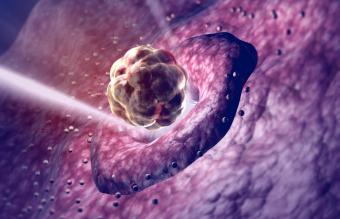
No woman wants to think about the possibility of pregnancy loss, but understanding the causes of early miscarriages is important if you are already pregnant or thinking about becoming pregnant in the future.
About Miscarriage
Spontaneous abortion is the medical term for a pregnancy that ends on its own before 20 weeks gestation. However, because abortion is such a politically-charged issue, this type of pregnancy loss is most often referred to as an early miscarriage.
Miscarriage is surprisingly common. Studies estimate that 10-25 percent of all recognized pregnancies end in miscarriage. Most miscarriages occur before the thirteenth week of pregnancy, which is why some women choose to wait until after this point to announce their news to friends and family.
Causes of Early Miscarriages
It is often very difficult to determine the causes of early miscarriages. It's a common misconception that a miscarriage indicates problems with infertility. Many women may have one miscarriage, then go on to have a healthy pregnancy.
The most common cause of early miscarriage is chromosomal abnormality with the fetus. This means that a faulty egg or sperm cell caused problems with the zygote during the division process. The fetus would have had no chance of surviving through the pregnancy, regardless of anything the mother did.
There is some research associating lifestyle factors with miscarriage, although it's hard to pinpoint specific causes in most cases. Some of the factors that have been linked to a higher than average risk of miscarriage include:
- Smoking
- Drug use
- Excessive caffeine consumption
- Advanced maternal age
- Hormonal problems
- Chronic illnesses such as diabetes, high blood pressure, or kidney problems
- Untreated STDs
- Infections
- Exposure to dangerous chemicals or radiation
Maternal trauma such as falling down a flight of stairs or being involved in an auto accident may cause a miscarriage. However, it's important to keep in mind that the fetus is relatively well-protected inside your body. You will want to contact your doctor for an examination after any form of maternal trauma, but the overall risk of harm to your baby is quite low.
The causes of early miscarriages do not include having sexual intercourse, working outside the home, or engaging in moderate exercise. Extreme stress does not cause miscarriages by itself, but it can contribute to a miscarriage if other factors are present.
Preventing Miscarriage
It's impossible to prevent every miscarriage. If there is a chromosomal abnormality with the fetus, there is nothing a woman can do to prevent miscarriage. However, chromosomal abnormalities are often random occurrences. Unless you have had several miscarriages and members of your family have a history of miscarriage, it is highly unlikely that you suffer from a genetic abnormality that would prevent you from eventually carrying a pregnancy to term.
Some of the steps you can take to help increase your odds of having a healthy pregnancy include:
- Do not smoke or spend time around people who are smoking.
- Avoid alcohol.
- Take a prenatal vitamin with folic acid daily.
- Limit or eliminate caffeine from your diet.
- Exercise regularly, but avoid contact sports.
- Check with your doctor before taking any medication, including over-the-counter drugs or dietary supplements.
Signs of Miscarriage
The signs of a miscarriage aren't always noticeable. If a miscarriage occurs very early in pregnancy, a woman may mistake the bleeding for her normal menstrual period. However, if you have already received a positive pregnancy test, it's important to be alert to any of the following symptoms:
- Mild to severe back pain
- Painful contractions happening every five to 20 minutes
- Brown or bright red bleeding
- White or pink mucus
- Tissue with clot like material passing from the vagina
If you think you may be having a miscarriage, contact your healthcare provider immediately. In the early stages of pregnancy, your body may expel all fetal tissue and require no further intervention. However, you should still see a doctor in order to rule out the possibility of hemorrhaging and infection.







